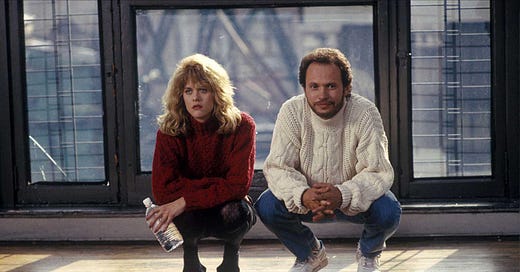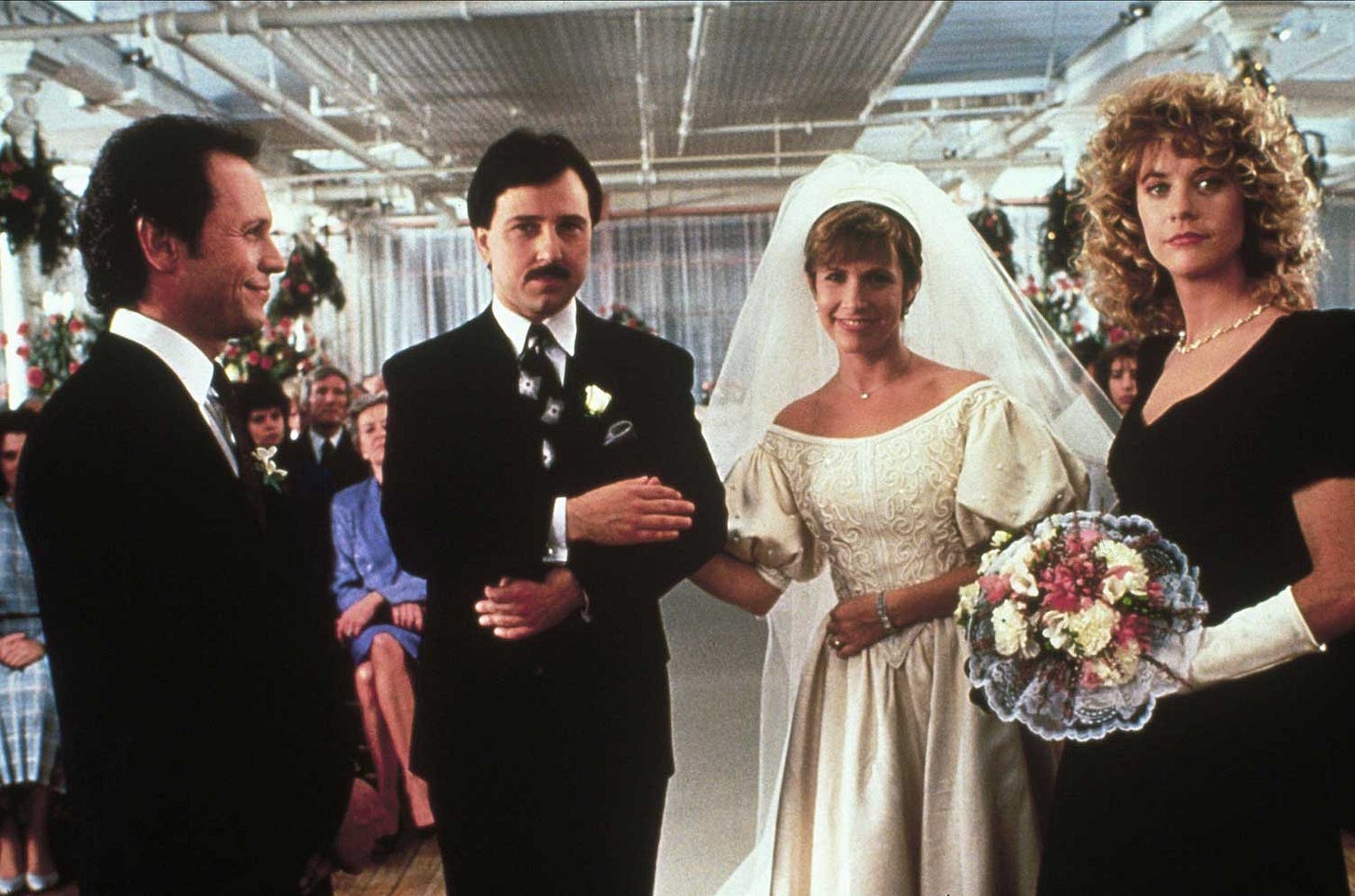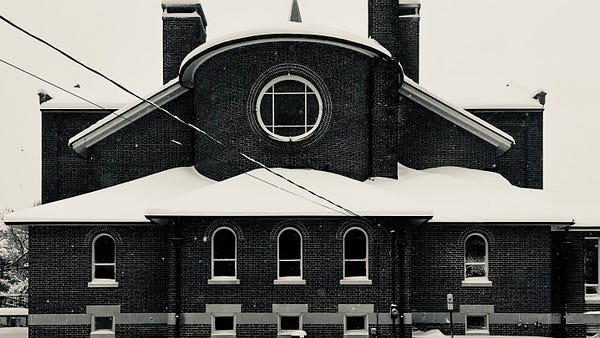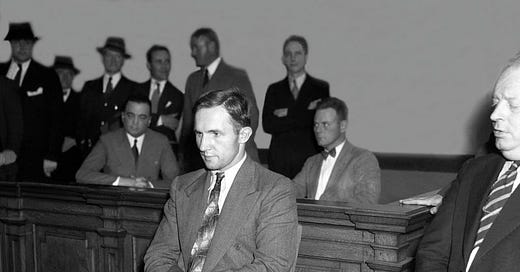
The Free Press

When Harry Met Sally might be the greatest romantic comedy of all time—not just because it’s a beautiful love story, but because it so perfectly captures the mishaps and horrors that often precede a happily-ever-after. Consider the scene in which Harry and Sally, just friends at this point, engage in a little game of one-upmanship that any veteran of modern-day matchmaking will recognize.
“How much worse can it get than finishing dinner, having him reach over, pull a hair out of my head, and start flossing with it at the table?” Sally asks.
“We’re talking dream date compared to my horror,” Harry replies, archly, before launching into his own tale of attempted romance gone awry.
This is to be expected. The thing about dating horror stories is that they’re an invitation to share your own—tales of awkward fumbles and cringing humiliations and kisses intended for someone’s lips that somehow instead ended up in their ear canal.
I have a little cache of these from my single days, no less potent for being nearly two decades old. Some of them are objectively funny, like the guy who glanced at my legs, grimaced, and told me I had “borderline cankles.” Others, not so much—like the boyfriend who invited me to visit him at college, brought me to his dorm room, had sex with me, and dumped me, all in the span of roughly seven minutes. I hadn’t even put my clothes back on.
I drove the 150 miles back to my own campus, sobbing hysterically—only to discover an email from my now-ex waiting in my inbox. My heart leaped as I opened it: Was it an apology? A groveling plea to come back?
“Hey,” it said. “FYI, you left your underwear here.”
The underwear part is where people usually start to laugh, because this is the other thing about dating horror stories: They have punchlines. It’s the fun kind of horror, the monster-slasher-jump-scare oeuvre where the hero always survives to tell the tale. And you can’t truly regret the bad dates, can you? Not just because they make a good story, but because they’re the price of admission to the game of love. That love is worth it has always gone without saying—whatever it is. Trial and tribulation, pain and humiliation and heartbreak: We weather these things gladly, certain in the knowledge that love lies somewhere on the other side.
Or rather, we used to be certain—before the dating discourse was overtaken by “men are trash” heteropessimism, the voluntary-celibacy movement known as “boy sobriety,” and a general sense that love is not only not worth it but maybe not even real. These days, when singles gather ’round to share tales from the trenches, there’s no winking understanding that when we call dating a horror, we’re only half serious. Instead, bad dates are treated less like something funny, and more like a valid reason to swear off the enterprise entirely.
“Heterosexual women have reached a breaking point,” The Cut warned in June, while HuffPost ran a lengthy feature on the young women choosing celibacy over situationships. Actress Julia Fox, an aspirational figure for many Gen Z women, has announced that she opted out of dating two years ago, and is now happier than she’s ever been.
A persistent question lies beneath all this: What exactly is the point of dating?
Once, as Jane Austen wrote, it was a truth universally acknowledged that unattached young men (and ladies) must be in want of partners. But then came the sexual revolution, during which dating evolved so that, for many young people, making a match ceased to be of primary, or even any, concern. It’s not just that, in 2024, a young woman might have casual sex before marriage; it’s that she might have sex with someone she is actively nauseated by the thought of committing to, or even seeing again, and nobody thinks there’s anything strange about this.
Dating apps, bless their little algorithmic hearts, have tried to account for the existence of relationship-seekers alongside those who are just looking for, ahem, a good time. A person who is sick of casual hookups and going-nowhere situationships can advertise as much on his profile, narrowing his search to those who are also seeking commitment—or who say they are, anyway. But actual dating-app users will tell you that this functionally reduces your prospects to almost nil: In a world where we talk about “catching feelings” as if it’s a disease, and wanting to fall in love is coded as cringe, the new truth universally acknowledged is not that young men must be in want of wives, but that those who admit as much in public must have something seriously wrong with them.
Indeed, the formerly agreed-upon end goals of dating—monogamy and marriage—have, somewhat bizarrely, come to be associated with political conservatism. This leaves young women, who disproportionately lean liberal, at something of a loss, if they’re seeking a partner. The men with whom they vibe politically are more likely to be commitment-averse, preferring open relationships or polyamory to the constraints of a traditional union. Meanwhile, monogamy’s biggest cheerleaders hail from a dark corner of the trad-guy internet that believes in marriage and commitment but also in the oft-discussed “wall,” which transforms every woman over the age of 27 into an unfuckable hag. Princes Charming, they are not.
All told, the cultural narrative surrounding romance has veered away from stories about people fumbling comically around the dating landscape until they eventually, joyfully, fall in love. Even an absurd anecdote like the When Harry Met Sally hair-flossing one would likely be reframed today as something sinister and scary. For women today, a date is more often than not seen as a hunt for the “red flags” that disqualify a suitor from consideration. Sally’s date would be labeled an abuser, and have his Bumble profile blasted all over the internet.
Indeed, a chief characteristic of our contemporary dating discourse is that we take it—and by extension, ourselves—much, much too seriously. The way we talk about even the most banal interactions in terms of violation and trauma reveals an underlying belief that if dating is a game, it’s one with monumentally high stakes, and there’s nothing fun or funny about any of it.
I believe this narrative is probably well-intentioned, at its roots—motivated by a desire to protect young women from emotional harm. But judging by the fact that women are swearing off dating completely, it’s clear that by pathologizing the normal and unavoidable frictions that accompany any search for love, we are scaring singles so badly that they disengage from that search entirely.
In this way, the dating-as-horror narrative becomes a self-fulfilling prophecy. I’m reminded of the dire warnings from the left that the state of Florida under Ron DeSantis’s governorship is categorically, physically unsafe for the LGBT community. As my colleague River Page wrote earlier this summer, fomenting panic among vulnerable people in the name of protecting them is not a morally neutral act: “The media may think it’s helpful to warn people that Florida isn’t ‘gay-friendly.’ But what they’re actually doing is amping up the hysteria.”
At a moment when a significant percentage of people under 35 are so consumed by fear of human interaction that they can’t bear to order a pizza by phone, perhaps we should not be reinforcing their terror by also advising them that dating is basically a roller-coaster ride through hell with no particular bright spots or benefits to speak of. And young women, particularly, are not served by believing—falsely, I should note—that the men to whom they’re attracted will almost invariably turn out to be monsters.
Is the pursuit of love sometimes fraught and painful? Of course; it always has been, as songs and stories throughout the history of civilization make abundantly clear. But if the risk of heartbreak always looms in the background of the quest for romance, so too does the possibility of finding a lasting connection. Or even a not-so-lasting one that nevertheless brings you joy and enriches your life.
And as for the horror stories, they have value, too. As the woman who wrote When Harry Met Sally famously said, “Everything is copy”; the worst dating experiences have a way of becoming our best material down the line. Even when miserable dates and bad breakups aren’t the stuff of romantic comedy, they’re still a valuable source of perspective.
There’s another scene from When Harry Met Sally, one I hardly noticed when I first saw the movie, but which struck me when I watched it again recently on a random weeknight—while my husband of 16 years lay at the other end of the couch, sleeping, and then periodically waking up to insist that he was absolutely not sleeping. It’s the moment when Marie and Jess, an engaged couple played by Carrie Fisher and Bruno Kirby, are each trying to counsel the still-single Sally and Harry on their relationship woes. When their respective conversations end, the couple hang up their phones, and turn to each other.
“Tell me I’ll never have to be out there again,” she says.
He says, “You will never have to be out there again.”
If the horrors of dating are worth enduring when you’re looking for love, they’re also the best reminder there is to be grateful, always, when you’ve found it.
Kat Rosenfield is a columnist at The Free Press. Read her piece “What the Childless Among Us Leave Behind,” and follow her on X @KatRosenfield.














